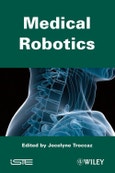For more than two decades, robots have been part of hospitals and have progressively become a common tool for the clinician. Because this domain has now reached a certain level of maturity it seems important and useful to provide a state of the scientific, technological and clinical achievements and still open issues.
This book describes the short history of the domain, its specificity and constraints, and mature clinical application areas. It also presents the major approaches in terms of design and control including man-machine interaction modes. A large state of the art is presented and many examples from the literature are included and thoroughly discussed.
It aims to provide both a broad and summary view of this very active domain as well as keys to understanding the evolutions of the domain and to prepare for the future. An insight to clinical evaluation is also proposed, and the book is finished with a chapter on future developments for intra-body robots.
Table of Contents
Introduction xi
Chapter 1. Characteristics and State of the Art 1
Etienne DOMBRE, Michel DE MATHELIN and Jocelyne TROCCAZ
1.1 Introduction 1
1.2. State of the art 7
1.3. Conclusion 42
1.4. Bibliography 42
Chapter 2. Medical Robotics in the Service of the Patient 55
Alexandre MOREAU-GAUDRY, Philippe CINQUIN
2.1. Introduction 55
2.2. A cycle of medical service growth 58
2.3. A case study: the ViKY robotic endoscope support system 64
2.4. Conclusion 67
2.5. Bibliography 67
Chapter 3. Inter-operative Sensors and Registration 69
Jocelyne TROCCAZ
3.1. Introduction 69
3.2. Intra-operative sensors 72
3.3. Principles of registration 76
3.4. Case studies 87
3.5. Discussion and conclusion 96
3.6. Bibliography 97
Chapter 4. Augmented Reality 101
Stéphane NICOLAU, Luc SOLER, Jacques MARESCAUX
4.1. Introduction101
4.2. 3D modeling of abdominal structures and pathological structures 104
4.3. 3D visualization system for planning 107
4.4. Interactive AR 108
4.5. Automatic AR 110
4.6. Taking distortions into account 122
4.7. Case Study 124
4.8. Conclusions 129
4.9. Bibliography 130
Chapter 5. Design of Medical Robots 141
Etienne DOMBRE, Philippe POIGNET and François PIERROT
5.1. Introduction 141
5.2. From the characterization of gestures to the design of robots 145
5.3. Design methodologies 157
5.4. Technological choices 165
5.5. Security 167
5.6. Conclusion 171
5.7. Bibliography 172
Chapter 6. Vision-based Control 177
Jacques GANGLOFF, Florent NAGEOTTE and Philippe POIGNET
6.1. Introduction 177
6.2. Sensors 183
6.3. Acquisition of the measurement 193
6.4. Control 216
6.5. Perspectives 224
6.6. Bibliography 225
Chapter 7. Interaction Modeling and Force Control 233
Philippe POIGNET and Bernard BAYLE
7.1. Modeling interactions during medico-surgical procedures 233
7.2. Force control 243
7.3. Force control strategies 244
7.4. Conclusion 263
7.5. Bibliography 263
Chapter 8. Tele-manipulation 269
Bernard BAYLE and Laurent BARBÉ
8.1. Introduction 269
8.2. Tele-manipulation and medical practices 271
8.3. Tele-manipulation with force feedback 278
8.4. Bibliography 298
Chapter 9. Comanipulation 303
Guillaume MOREL, Jérôme SZEWCZYK and Marie-Aude VITRANI
9.1. Introduction 303
9.2. General principles of comanipulation 309
9.3. Serial comanipulation: intelligent active instrumentation 316
9.4. Parallel comanipulation 331
9.5. A human in the loop 343
9.6. Bibliography 346
Chapter 10. Towards Intracorporeal Robotics 351
Etienne DOMBRE, Nicolas CHAILLET and Michel DE MATHELIN
10.1. Introduction 351
10.2. Mini-manipulators/tele-operated instrument holders 352
10.3. Robotized colonoscopes and autonomous capsules 357
10.4. Active catheters 362
10.5. Evolution of surgical robotics 366
10.6. Additional information 386
10.7. Bibliography 388
Conclusion 397
Notations 399
Medical Glossary 401
List of Authors 407
Index 409








